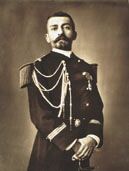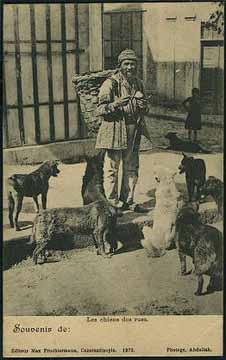|
|
From the book, "Golden
Horn," Chapter
"Vultures of Christendom," pp. 82-2
"Turkish atrocities! This cliché of the Crusaders (published everywhere with the
help of the banknotes of the Balkan Committee in London) continues to be reproduced in the
French Press. . . . Alas, it may be true. But the Crusaders! When will their crimes be
known? Wounded Turkish officers and soldiers have been found without nose, lips, or
eyelids, all of them having been cut off with scissors. . . . I am nearing the end of my
life on earth. I desire and fear nothing, but as long as I can make myself heard it is my
duty to speak the truth. Down with wars of conquest! Shame on these slaughters I
“From Turkey we French have taken Algeria, Tunis, Morocco. The English have robbed her
of Egypt. Poor, beautiful, meretricious Italy, thinking she was marching to glory, turned
Tripolitania into a charnel house. We lay our heavy and disdainful hands upon these
conquered countries; the least of our little bureaucrats treats every Moslem as a slave.
From these believers we have taken, little by little, their trust in prayer; and upon
these dreamers we have imposed our futile excitements, our anger, our speed, our alcohol,
our intrigues, our iron civilisation; unrest follows us everywhere, together with ambition
and despair.
|
"I do not
believe there is a race of men more thoroughly good, loyal, kind."
|
“The Turks are misunderstood by Westerners
who have never set foot in this country. I do not believe there is a race of men
more thoroughly good, loyal, kind. I must except, alas, some who have been brought
up in our schools and gangrened in our boulevards: they become officials afterwards:
I leave them aside. But the people, the real people, the petits bourgeois, the
peasants — what better men could you find ? Ask those of us who have lived in the
East which they prefer: Turks, or Bulgarians, or Serbs, or any other Levantine
Christians, and I know what the answer will be!
 |
|
Pierre Loti
|
“The kindness of Turks for animals might be an example to us
all. With what cheerfulness the dogs of Constantinople were nourished for
centuries ! How often some Turk would come down into the street to cover their
puppies with a rug when it rained! And the day when the Municipal Council,
composed chiefly of Armenians decreed their destruction in the atrocious way the
world knows,[1] there were battles in every quarter of the city, indeed almost a
revolution to defend the dogs. As to cats, they never get out of the way of the
inhabitants, knowing that passers by will leave them in peace. And at Broussa, in
one of the adorable corners of that old Moslem city, there is a hospital for old
or wounded storks who have not been able to escape the winter. Some of them are
swathed in bandages, others have their legs in splints. When I visited the place,
there was a senile owl there, who lived on charity, like the storks. . "
Pierre Loti was my literary hero, but he and his sick owl belonged to another age:
the new era was being ushered in by the booming of the rival artilleries of Krupp
and Creusot.
* * * *
1 There was a saying in Constantinople that when the Turk should rid himself of
the race of dogs that had followed his nomad ancestors from the steppes of Central
Asia, the city would cease to be Turkish. At the beginning of the nineteenth
century, under Mahmoud the Reformer, an attempt was made to abolish them. They
were taken to an island, but promptly swam back. Nearly a hundred years later, a
merchant offered to put them all in a lethal chamber, intending to turn their
skins into gloves, but even Abdul the Damned rejected this proposal. Under the
Young Turk regime, however, it was felt that something should be done to creatures
who merely lay in the sun, contemptuous of Progress, so they were collected in
rubbish carts, with closed iron lids, and taken to the island of Oxyea, eight
miles from Constantinople, where there was no water. Daily the lighter brought new
dogs and those already on the island killed them in order to drink their blood.
Eventually all died of thirst.
|
The Bloody Sultan: No
Massacre for Dogs
|
 |
|
Dogs
of Istanbul |
"...[A]nd in 1875 the empire was
forced to declare bankruptcy."
In the last years of the empire, a French firm offered half a million francs
to turn 150.000 street dogs in Istanbul into gloves. The Sultan
— very hard pressed for cash — nobly refused. The dogs were locked up in
an old tramp steamer and transported, howling and fighting to a waterless
island (Hayirsizada) where they were turned loose.
“Lords of the Horizons” Jason Goodwin, Henry
Holt Co, NY, pgs. 311, 325.
|
| Are Armenians &
Greeks correct when they say Turks are for the birds? |
From the Italian writer Edmondo
de Amicis (1846-1909)'s book named "Istanbul"
Istanbul has a unique vivacity and elegance because of countless birds from all
kinds, which Turks love and protect. Mosques, groves, ancient city walls, gardens,
palaces, everything sings songs, boozes, tweets, warbles, chirps; the touch of the
wings is felt everywhere, in every place there's liveliness and harmony. Sparrows
courageously enter homes to bait from the hands of women and children; swallows
build their nests on the doors of coffee houses or the domes of bazaars; innumerable
flocks of pigeons that were fed by sultans or other people form circles of white and
black around the minaret balconies and along the eaves of the domes. Seagulls fly
with joy, thousands of doves make love under the cypresses of cemeteries; crows caw
in Yedikule; vultures fly in circles; terns shuttle between Black Sea and Marmara in
long lines, and storks chat on the kuppels of deserted mausoleums. For Turks, each
of these birds has a beautiful meaning or a fortunate impression: Doves protect
love, swallows protects the houses on which they build their nests from fire, storks
go to Mecca for pilgrimage every winter, terns bring the good souls of believers to
heaven. Hence with appreciation and devoutness, Turks preserve those birds and feed
them, so the birds convive around their houses, above the sea, and amid the
cemeteries. Everywhere in Istanbul, above people's heads, all around them there are
birds; chirpy herds, which spread a pastoral joy and refresh you by renewing the
sense of nature in your spirit, just pass you by, barely touching.
(With thanks to Damla Ozdemir for the translation.)
|
| "Thou shalt not kill inoffensive animals." |
Though the Mohammedan religion may appear admirable and inspiring to
the occasional unbiased observer, it nevertheless has certain faults which are a regular
nuisance and caused us many unnecessary losses during the war. For instance, its precept:
"Thou shalt not kill inoffensive animals." How often did I look on in dismay,
and absolutely powerless to prevent it, while our kind-hearted askars, on a sunny
day in the snow- covered mountains of the Caucasus, squatted around their camp-fires
examining their underwear and instead of squeezing the cooties to death dropped them on
the floor still alive; where- upon those cooties wagged their tails with appreciation and
clambered immediately up the nearest soldier's leg to thrive and multiply.
Rafael de Nogales, "Memoirs of a Soldier of Fortune" (Garden City, NY, 1932).
|
|